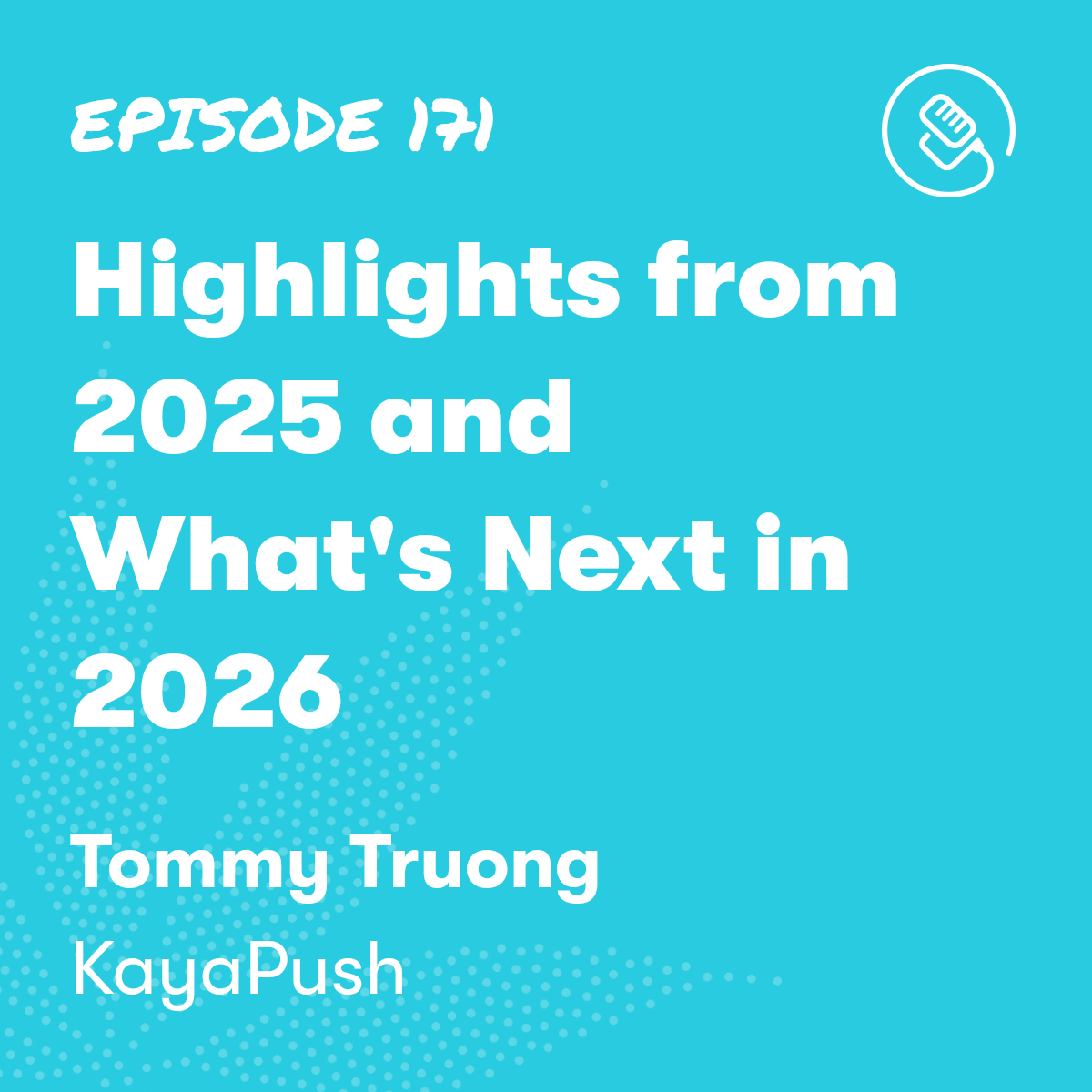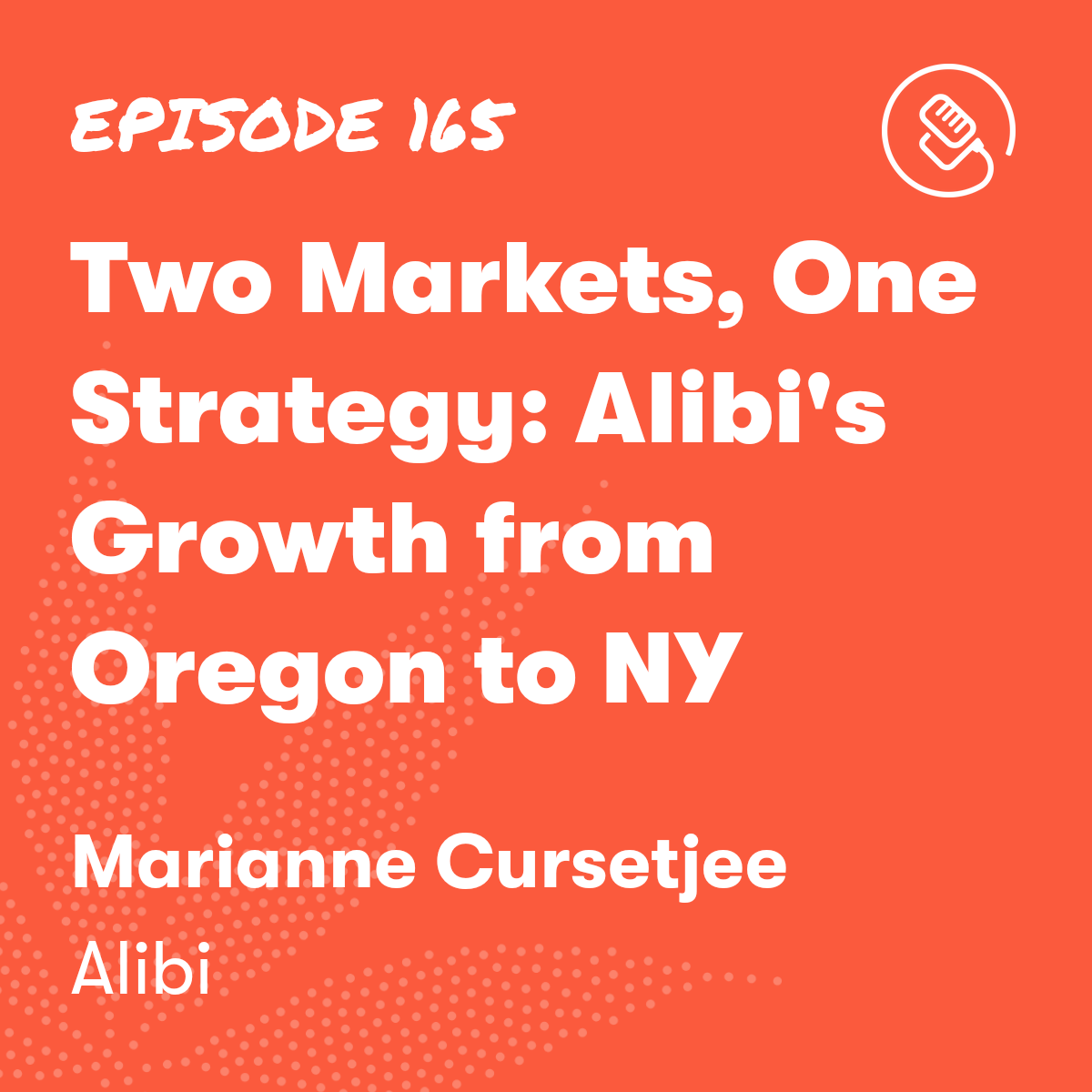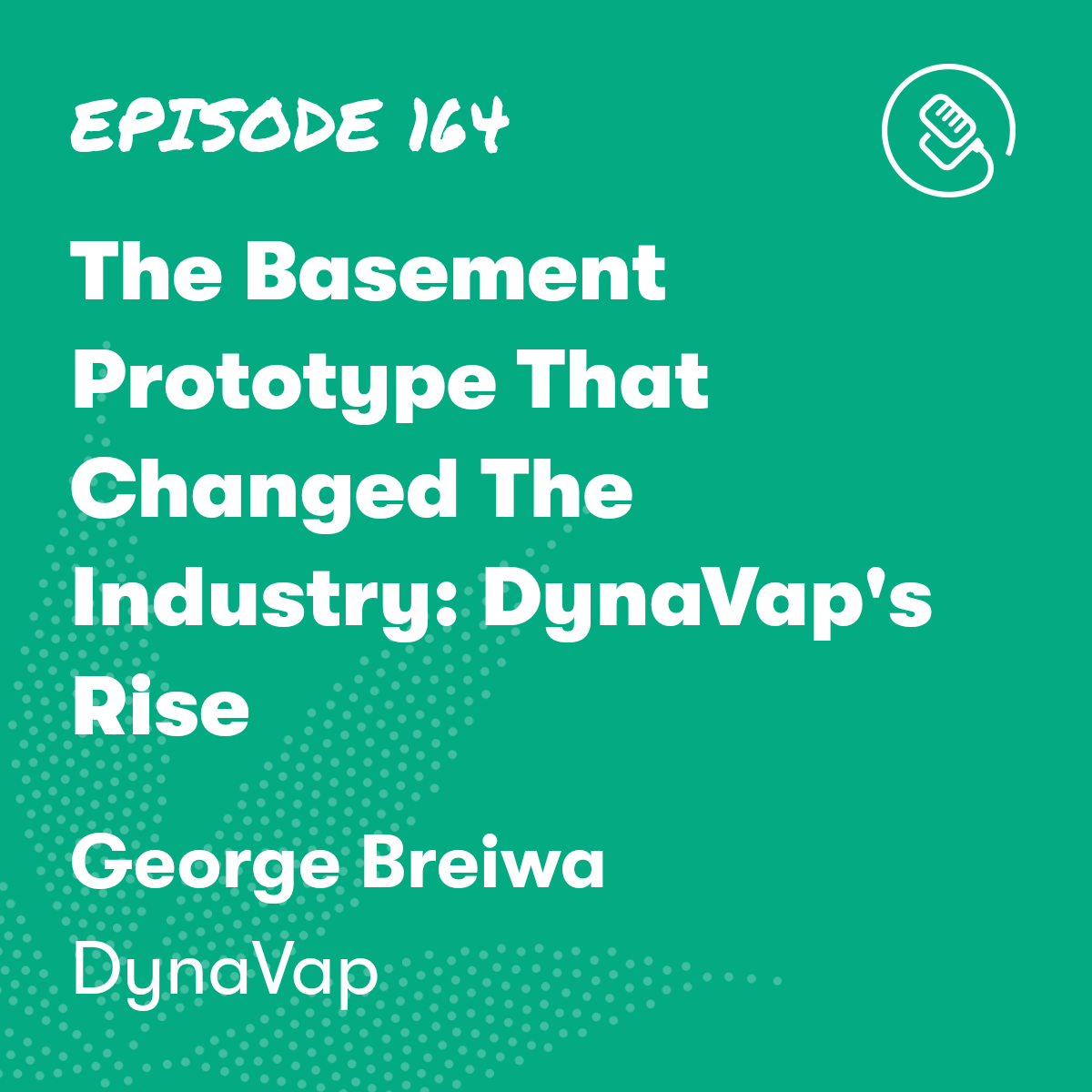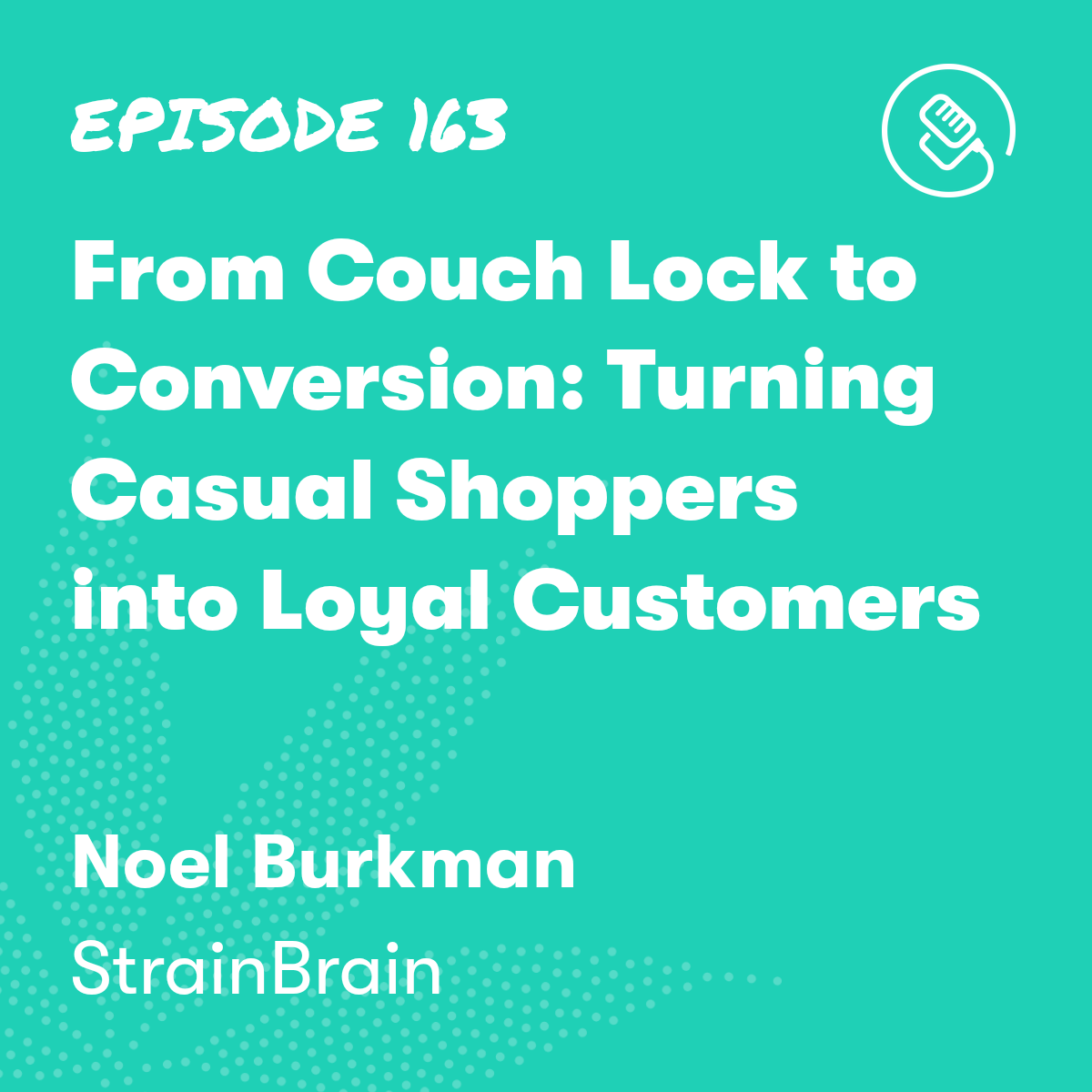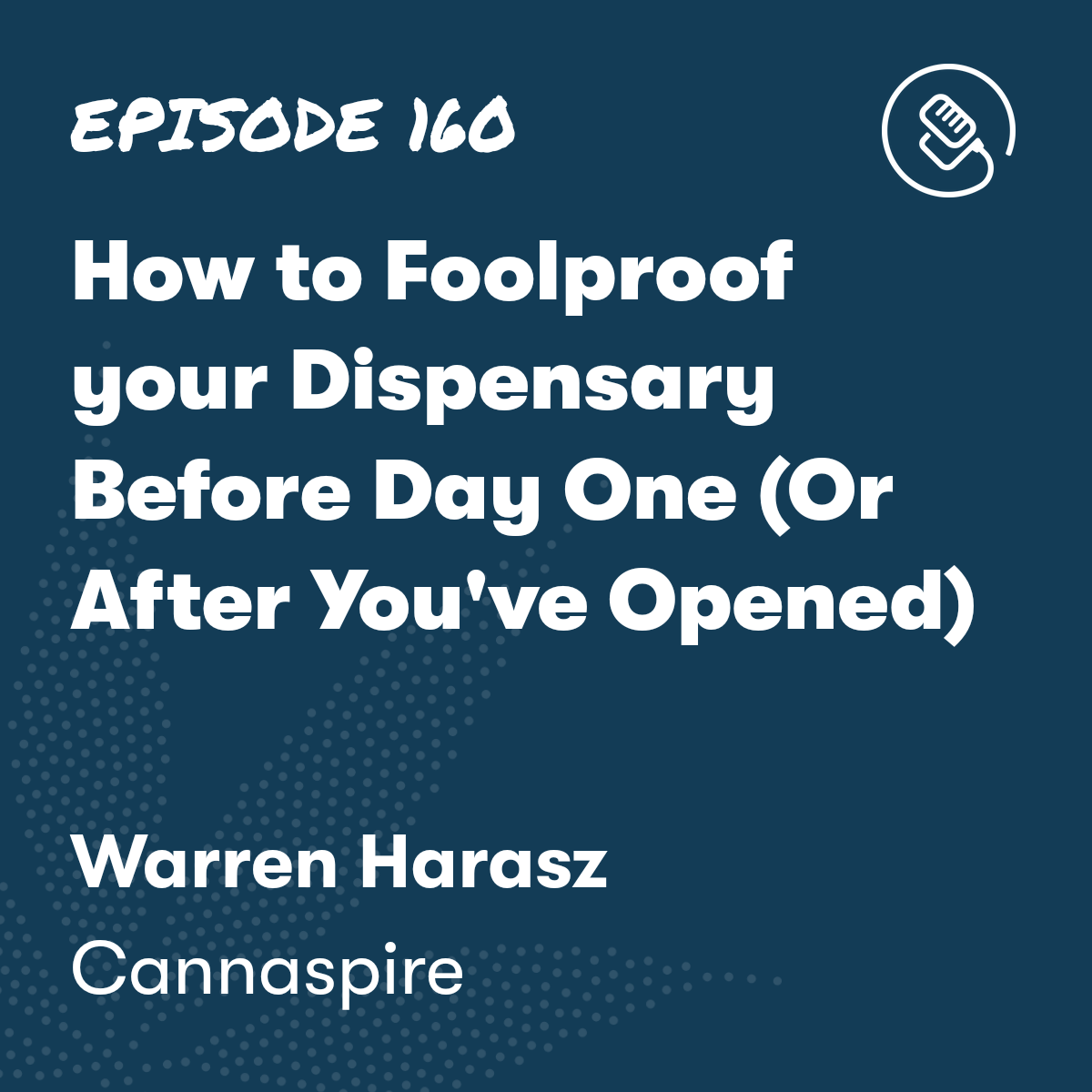

Securing Your Cannabis Retail Operations with Tony Gallo
Episode Description

Episode Transcript
Tom Mulhern: I am so excited to share another one of my interviews from MjBizCon, and this is actually the very first interview I did when I got there. And, you know, I just arrived, uh, into Vegas. And walked into the convention center with the 35,000 other people that were there. 1200 vendors from all over the world.
And I gotta say it was a great start to, uh, the different interviews I did while I was there. My first interview was with Tony Gallo, and Tony Gallo is the managing partner for Sapphire Risk Advisory Group.
Which is one of the top security companies in the cannabis industry. Tony has more than 30 years of loss prevention, audit, safety, risk, emergency management. He's considered really one of the leading authorities on cannabis security, armed robberies, burglary investigation. He's a published author of Cannabis Security.
And over the last seven years, he's spoken at tons of cannabis business conferences across the country. Tony is always out there, always meeting people in the industry and Tony is just a fantastic individual.
It's always great when you meet people and you just know, that they're so down to earth. And that's really, that's really who Tony is. During my interview with Tony, we dove into all sorts of great insights into cannabis security. Cannabis retailers can do to, you know, assure that they have the security in place that they need. And so I hope you enjoy this interview with Tony Gallo from Sapphire Risk.
Tom Mulhern: Tony, thank you for joining us here on the Kaya Cast Podcast. We're at MjBizCon. It's noisy and I'm excited to chat about kind of how you got into cannabis. So let's start there. How did you get, tell me about your background and how you got into cannabis.
Tony Gallo: Sure. So, so I've been in the retail security field about 25 years.
Even, maybe even longer. Uh, I was the regional director for Sears in the New York, uh, city area. Okay. I was the, uh, director for a, uh, retail company, which now is part of Macy's. And then I spent about 17 years as the director of a publicly traded pawn shop chain. 1300 stores in three different countries.
And then in 2013, I left them and I started a Sapphire Risk Advisory group. And we were, we were only focused on high risk businesses, companies that had large amount of cash and a very desirable piece of merchandise. So jewelry stores, pawn shop, liquor stores, firearm stores, convenience stores, tobacco stores.
Tom Mulhern: Did your experience then of being in those high risk industries, has that shaped what you're doing with Sapphire?
Tony Gallo: It did. It was very interesting how we, how we got involved in the cannabis industry because when I started the company in 2013, I knew nothing about the industry at all.
I got a phone call from a company that was starting up. They said, uh, we're doing a con conference in Boston and we need someone to talk about how to secure your cash in the cannabis industry. So I hung up the phone, I said, let me call you right back.
And I'm like, let me look up what to do. And I'm like, large amount of cash, very desirable piece of merchandise falls right into that jewelry pawn, you know, that I've been doing. So I called back this startup company called MJ Biz .
This, this little business. Talked to Chris Walsh. Okay. There were 125 people at the first event. Wow. There were 15 vendors and uh, I remember the, the person who spoke before me headed up MedMen now he ran MedMen and the guy after that was like, gti, and we went from there and then from there on, you know, well I did another speaking in Chicago and so forth and so on.
Tom Mulhern: So, so you've grown in the cannabis industry. How long have you been in it exactly?
Tony Gallo: We started in 2013, so this is our 10th year. Oh
Tom Mulhern: wow. We need to have a birthday cake or something for your 10th year. Right. In that experience, do you bring elements of that pawn industry the high risk into what you do as sapphire risk?
Tony Gallo: Very much so. I first started, obviously this industry was much different than it is now, but I think there's still a concept that cannabis is a very unique thing like nuclear waste or something, you know? And it really, it's a retail business. Yeah. You know, You grow in a product.
You produce a product, you sell the product, the dispensaries, if I remove the cannabis from a dispensary and substitute a jewelry, it's very similar to a jewelry store in a lot of ways. Yeah. Or, or, or something of that nature. So I take a lot of the, the 25 years of retail experience and we try and use them in our designs.
We're very proud, like, you know, knock on wood, but we've been doing this for 10 years. We worked with over 600 clients in 35 states and none of our clients have ever had a robbery. Oh, wow.
Tom Mulhern: That's pretty crazy to me cuz like, do you have any horror stories of like, security things that have happened or has it been pretty, you guys have created pretty secure systems?
Tony Gallo: We come into a lot of companies that after they've had a problem, a break in or a robbery and we'll, we'll do a on-site risk assessment and work with them on designing a better program. Now, unfortunately, they've already lost, you know, a hundred thousand, 300,000. One of the things that I've come across was, uh, the improper use of the secure safe, I would call it.
A lot of companies when they first started, and you know, as you know, the cannabis industry started in the West coast and moved to the East coast. We're using what's called a gun safe. And gun safes are really just a metal box, not really designed to prevent anyone from breaking in except like your son.
But they're also designed to prevent any, if there was a fire at your house, the guns would be secured. So the safest line with Sheetrock. Regular Sheetrock, basically, unlike a regular, they're called TL Rated Safe, which you would see like in New Jersey or New York. Yeah. And that's, that holds true, unfortunately during some, uh, looting and robbery that's happened throughout the United States, uh, we were able to see that 23 of these locations, all their safes that were breached were all gun safe.
So you, you, we took a lot of what we learned from the retail business, and that's just one example and we brought it into the cannabis industry.
Tom Mulhern: Is there a lot of security upgrades that some of those legacy markets have to do now. Like you said, it's moved from the west to the east. Is there, is there the ability to do those upgrades?
Tony Gallo: I, I think that you're, they're seeing more and more from and able to run your business. You know, think about, you know, the cannabis industry, large amount of cash, even now, still a large amount of cash.
Very desirable piece of merchandise. If you don't have good security, it's gonna affect your margins because you're gonna have losses, whether it's internal losses or external losses. And you also see now some of the states are getting involved. Colorado has changed and now requiring more, California's starting to do the same thing.
If you look at a security program in Oregon and compare it to one in Massachusetts, it it it's night and day. Those states, they're just beginning to see it and for two reasons. A, it's being required by the states in some, some areas, but b, it's really just good business sense to do something. Maybe you didn't know you should have been doing 10 years ago.
Tom Mulhern: So let's back up a little bit. What exactly does Sapphire Risk do? Like give me the elevator pitch of what you guys,
Tony Gallo: I'll give you the 30, the 30-second elevator, the 30-second elevator pitch. Like I said, so we've been doing this for 10 years. We've worked with about 600 clients in 35 states, and we do three, we call them phases.
Phase one is we help the clients get their application and get their license, to be able to be in the cannabis industry. Currently we're working with over 130 of them in New Jersey doing exactly that. Although we focus on the security part of that application and we've had some very high scores, perfect scores in Illinois.
Some of our clients, we also help them when it comes to the other things, accounting, law firms, architects, so forth and so on. We find that I and I never figured out why. Uh, you'll have two individuals that are sitting there at a bar and they're gonna go, Hey, let's get in the cannabis industry. And the first person that calls their lawyer, and the second person that calls me, and I don't know why, but I'll get calls and they're like, look, we're looking to get into the cannabis industry.
And I'm like, okay, what have you done? And they're like, absolutely nothing. You know, can you help us with that? So that's phase one. Phase Two is we actually designed the build out of a facility. We've built over 72 locations. And we'll come in.
We don't sell any equipment, no cameras, no video, no alarms, no access control, but we'll design the security that meets the regs, and then we'll put it out to bid. You know, we can put it out to some, national companies like ADT or Securitas, where we can do the local, we can even do your brother-in-law.
He knows what he's doing. We did that in, in, in North Dakota. As long as they can do the job and they're, they're capable, we'll work with them.
And then the third is kind of the most important thing is we write policies, the day to day policies, procedures of how to stay in business.
Robbery awareness, cash management, alarm opening and closing, employee theft. You know, these are all basic retail and you'd be surprised how many locations don't have the basic security day to day procedures.
Tom Mulhern: What are some of the biggest risks for cannabis retailers? Like you mentioned, you know, those policies and procedures, employee theft. What are the biggest things that you guys see for security?
Tony Gallo: I think if you look at retail and as a whole, and cannabis follows suit, 80 to 90% of all the losses that occur in the industry is internal. Either employees stealing or employees affecting the margin because they don't care about the business.
Very few robberies occur. Very few break-ins occur, and a lot of times when they do occur, you look at it and you go, because you left yourself wide open to that. Yeah. But a lot of people, You know, they'll be, uh, pressed by an security integrator. They'll say, oh my God, you need to do all this and you need to double the amount of money you were gonna budget because you're gonna get broken into and robbed.
But really they should be focusing on their employees themselves and making sure just like jewelry, just like pawn, just like a big box department store. It's the employees that they need to have those procedures in place.
Tom Mulhern: Well, they're investing thousands and thousands of dollars into cameras and security controls.
Right. What are some ways that you know, they can invest in mitigating that risk of employee theft, if that's the biggest issue?
Tony Gallo: No, that's a good question. What I would really focus on is your procedures themselves. Let me give you, for instance, we had an individual that was losing cannabis and could not understand why affecting his margin, and we were able to go in and determine that in the trim room where they were cleaning the buds.
One of the trimmers who they wear latex gloves, would palm a bud or two, pull the latex glove off his hand, throw it in the trash. He really didn't care who was picking up the trash. Yeah. But at two o'clock in the morning, because they had a poor waste disposal program, they, he would go and get the big black trash bags Okay.
Of cannabis. We've had employees that have under rang sales for their friends, employees who have not rang any sales and pocketed the cash and allowing people to take it. People who have given out abundance of samples, as they call it, free samples. Free samples, a lot of free samples with that.
And a lot of that just falls right down into that policy and procedure of, you know, are you doing some of the basic things. And again, I'm not reinventing the wheel, I'm just looking at other retail companies and saying, Everyone else does this. Why aren't you not doing this?
Tom Mulhern: You work with businesses on every step of the journey. For those businesses that are, you know, set up, they're established, they've got their license, everything's going, is there a way for them to kind of assess how adequate their security is? Like, do you guys do an assessment? Yeah. And come in and what does that process look like?
Tony Gallo: So, we'll, we'll come to your location. It's usually a one day risk assessment. We'll, we'll look at not only your physical security, but your policies and procedures. Talk to some of your employees. You know, you'd be amazed how many times I've found windows that you can just open in the back room that haven't been secure, cuz no one thought about the windows not being locked in the bathroom or somewhere else like that.
Then we'll come back and we'll say, you know, these are some of the deficiencies that we've seen. These are some of our recommendations that you can do. You can utilize your in-house security or your people that helped build out your facility or we can help you with that. Like I said, if you had to upgrade your safe or something like that.
Tom Mulhern: Do retailers often take you up on your suggestions or are there some that say, ah, no, we're fine.
Tony Gallo: We have a lot that do listen to what we say and they'll take our suggestions. Sometimes, not all of them.
Sometimes they'll, they'll hold off and then when they realize that they've had a problem, then they'll come back and they'll do the rest of it or whatever. That came very apparent during, any time like a looting situation where there is no law enforcement, their exposure of that and maybe the suggestion of how to better lock the door in their secured storage room.
So just like any other retailer, they'll look at that. They'll look at the cost and a lot of them do follow suit because again, they. Their margins are thin. I mean, you know, and, And now even more so than 10 years ago, their competition is fierce too.
You're not the only cannabis dispensary in that town anymore, and there are five more people, the other dispensaries, there. So just like any other place, you want to be able to be as profitable as you can.
Tom Mulhern: Looking at helping with that application process, how does Sapphire kind of improve the odds of getting an application through the door? Like what do you guys, how do you guys work on that city state kind of licensing?
Tony Gallo: So if you look at the cannabis industry from the application point of view, there's, there's three different markets of applications. You can apply, the state will give you a license for the most part. It's the wild west basically. So you look at those states such as Oklahoma, Colorado, Oregon, Washington, where for the most part, if you apply and you meet these certain thresholds, you can open up your location, but there's also 10 locations in the same town. So you need to be good at what you do.
Then there's the merit based application where they actually score your application. We average a 96% score on our security score, and every point really matters. In Missouri, which is one of the merit based, there were people that lost by five points. There were some people in some states, that lost by like two points and three points.
And then there's a hybrid, California, New York, New Jersey. As long as you meet the minimum requirements that they are set forth for cannabis we'll allow you to have a license provided that the town has given you what's called a letter of resolution.
In order for you to apply to the state, you have to show that the town has given you approval. Now, when you go into the town, they may only be given out four approval letters. So now you are applying against, you know, 40 people or 30 people for five licenses, and that's where they look at everything, including your security plan to determine who's the most capable and who should get a, the resolution or shouldn't. So that you can apply to this state?
Tom Mulhern: What are some of the things they look at for approval of those licenses?
Tony Gallo: Very much involved in what you are gonna be doing for the community. That's something that you really need to be able to focus on and speak to the town council.
Some towns have a, a cannabis control board. You go through that, then you go to their planning board. And then you go to their city council, get the approval. Some you just go to city council, but why should you get the license compared to someone else that's applying? Yeah. You know, are you doing an expungement program?
And some states are very focused on expungement programs there. When it comes to security, they're very focused on the outside of your facility, much more than the inside of the facility. And they wanna understand, are they gonna have to hire more law enforcement because you're gonna have more break-ins and robberies.
What about a line? Will there be a line stretching outside and it's gonna affect the bagel shop right next door? Cuz now you have a line of people waiting to get into your facility. How are you gonna prevent that? Will people be smoking cannabis in your parking lot? Yeah, that's, you know, what will the security person, if you have a guard, what's his role gonna be?
Is he gonna be helping, just in in the front or is he gonna be patrolling the area? How are you going to affect the community more focused on whether you'll be profitable or not?
Tom Mulhern: So have you had examples of where they were close but they didn't have enough of that merit to get the application?
Tony Gallo: I'll give you a little bit of our secret sauce. Yeah. So when we come on board with our client, we're very focused on trying to understand what the local law enforcement wants. We'll go and have a meeting with the chief of police or something of that nature.
We had a town in California. They were giving out only four licenses. We had three clients in there, and I think there was 30 people applying. Okay. And the chief said, you know what? If you could put the address of the building on in three foot letters so that if a helicopter flew over ahead, it would make me very happy.
And I said, sure. It's not in the city regs. It's not in the state. All three of our clients, one wow licenses. We've put park benches, aggressive plant, like thorn bushes, pots that prevent people from driving in. Had their SWAT team do a review of the location. So really a lot of times it's getting in front of them early in that stage and saying what do you want? We wanna be part of this community. How can we do this and how can we help? You want access to our camera system or whatever. And a lot of times that'll go a long way when they're making their final review compared to somebody who's just applying.
Tom Mulhern: Knowing what they're actually looking for and, and that probably is what sets you guys apart is that you're willing to go to the town council or the police and say, now what is it? What is it that you will make you feel good about us coming here, right?
For a new business, or an established retailer, when is the best time to think about security? Is it right when you're starting or is it, I mean, I guess you kind of have to with the application, but you know, if, if there's someone that's been in business for a while in Colorado and they're like, oh, my security's not quite there, what's the best time to do that?
Tony Gallo: We usually get involved very early because we can help with the design, we can work with the architect in designing their floor plan, maybe save them some money, because of the designs that we've seen over the years.
So we usually get involved about 10 months prior to you applying for that license. Now for a person that just started their business or have been in in business for a while? I think the best approach really is if you have a concern and you're thinking about utilizing us, then you have a concern and you need to utilize us because you know something, whether you know it in the back of your mind or not is going on.
And you want to be able to have someone come in. And I think the easiest thing is just have a risk assessment. Yeah. Where we'll come. Spend the day there, come back and say, look, everything looks good. We don't see anything major. Here are some minor things we would do. And now you have that, that piece of mind and that comfort. We do a lot of MSOs nationwide and uh, I think that that has a lot of value for even the small, smaller companies.
Tom Mulhern: So now you've been, you've been coming here for 10 years, you've been in the industry for a while. What do you kind of see as the future of some of that CannaTech or security? What's the future look like in cannabis security?
Tony Gallo: I think when the industry first started, the, the philosophy was if you could put a hundred cameras at your location, then you're secure. And that's a misconception.
How do you best utilize that camera system? Do you, do you bring in a system that can help monitor that? Like a net watch kind of system that helps monitor the cameras and identify when there's a, a challenge? You can do geofencing, which means you can identify to camera activate and, and let you know on your phone if someone enters a particular area or something of that nature.
How do you use proximity key card, or access control devices. And so what I'm seeing more in this industry now is it's growing up. A a lot of what they did in the past isn't working anymore because the industry changed. So now you have to change with the industry. And like I said, if you look at one of our buildouts on the East coast and compared to one of the buildouts on the West coast, from a security point of view, it's two different industries.
Yeah.
Tom Mulhern: What about cultivators? Do you work with cultivators for security and what does that kind of entail?
Tony Gallo: Funny, the largest cultivated work, what is in Las Vegas? 450,000 square foot growth facility. 105,000 plants we put in the ground there. And then we work with the 2,500 square foot facilities, 500 to 800 plant type of guys.
The thing a lot of people miss sight of in the cultivation when it comes to security is they're focusing on the plant and their grow rooms and how to secure that, where they should be focusing on how to secure the bag and the secured storage room. If someone broke in and grabbed 10 plants out of the ground, that's not a good thing to happen.
But if someone grabbed 10 bags, Out of your process secured storage room already, that that's where your significant loss occurs. Focusing on the actual, uh, finished product first and then focusing back out to the grow rooms.
Tom Mulhern: Well, and that's probably a shift, like you're saying, like most people have all their cameras trained right at the plants, and plants aren't moving. They're, they might be growing, but they ain't moving, you know? Like you said that that trimmer, who's sneaking it in and you know, are there ways that cultivators can mitigate some of those risks?
Again, it sounds like it's a lot of employee theft more than break and enter.
Tony Gallo: So the, the obvious place is very focused on, focused on the trim room. That's where most of your loss can occur cuz that's where the products being touched for the most. Uh, ensure that you have a good waste disposal program. A lot of companies do not have a good waste disposal program when it comes to that.
Be able to watch and follow the plant, which is a lot of state requirements. So now I am gonna have cameras in the grow room. I'm gonna have cameras in the hallway, but be able to make sure that people understand that I have these cameras and that they're being reviewed.
Focusing on the policies of the, of the flow to plan from, if you don't want to lose any of your intellectual property, how does your mother room look? Or, you know, or what's going on in the clone room? And if you don't wanna lose property, that's gonna be out there for sale quickly is really, where is that cannabis being stored? It's being stored and you're secured, uh, at storage room.
Tom Mulhern: Do you have any tips or tricks for a cannabis retailer to kind of grow their business like some inside. You worked with so many different retailers. What's something that you've seen that's really helped someone grow their business?
Tony Gallo: The cannabis facilities that are successful that I've seen are very similar to other retail, and that's good customer service. If you have people that are there and they're engaged and they're helping you and they're responsive, you're gonna come back to that location.
That'll also help prevent shoplifting or other kinds of losses from occurring. And from a security point of view, really, you don't want guards everywhere.
You may have a guard in the front of the location at a retail location. But for the most part, your employees are your security.
Tom Mulhern: Well in that customer service, like, you know, obviously there's the big players, but then even on the smaller scale of like your local, I live in a small town and our local store there's, there's four or five different dispensaries, but I go to the same one because of that customer service.
I get those bud tenders who know what they're talking about and are willing to like point me in the direction of what I need, you know, so that customer service. Is key to growing that business.
Tony Gallo: And then from an external point of view, it all starts on the outside. I pull up to your location, your parking lot is dirty and there's paper all around and there's, and there's graffiti on the wall, and no one's cleaned the windows.
You don't care about your location. No. So why should I care about your location? If you look at the number of robberies, and I've dealt with unfortunately, over 2000 armed robbery investigations in my career in retail. One of the overwhelming factors, a high, high percentage was when you pulled up to that location, it kind of said, we don't care about our location.
Yeah. So why should you?
Tom Mulhern: What's the coolest thing that you've seen here during MjBizCon? That's kind of like a brand new thing.
Tony Gallo: The coolest thing, there's a, there's a booth here called Tameka. Okay. It's in the 7,000 series, and the reason why I like Tameka is they actually show you how they would design a cannabis facility. Okay. And they're a design company. And I found it cool because I like, like models and things of that nature. I'm a visual person. Me, me too. So I found that that was something I like.
Tom Mulhern: Well, and Mike Wilson's there, so, you know, he's gonna make it fun.
Tony Gallo: He has a bigger ego than I do and that's hard to do.
Tom Mulhern: Well, you know, he's great. He, he was on the podcast too, and I. Yeah, I had a great conversation with him. Well, Tony, thank you so much. How can people kind of connect with you and what you guys are doing at Sapphire?
Tony Gallo: So our website is sapphire risk.com. Uh, my name is Tony Gallo. I'm the managing partner, and you could reach me, (512) 422-7600.
That's my cell phone. Oh, man.
Tom Mulhern: Well, thanks for being on the, the podcast. I'm sure. We'll, we'll have to have you back. Uh, you know, you, you've got an amazing team. You're doing some cutting edge stuff and yeah, it's great talking with you. Thank you. All right. Appreciate it.
Tom Mulhern: So many times cannabis businesses, they forget about how important security is from start to finish, really from when you're setting up your application to your day to day operations and Tony's insights into what cannabis retailers need to know is so key. And so, um, I wanna, again, thank Tony and the whole crew over at Sapphire Risk for a for this great interview, but also for just being such a great partner and for really throwing some great parties while we were in Vegas. Um, you know, I got the chance to hang out with Tony and Katherine and the crew over there at Sapphire and really they were just such amazing people.
So if you are looking for someone to kind of help put some of that security in place for someone to come in and maybe do an assessment of your current setup and see if there are gaps in what you have. Reach out to Sapphire Risk. They will help you, you know, be a more secure company, more secure retail location, and they can work with you at any step of the game.
It sounds like from the beginning to the end. Uh, make sure you contact them. We'll have links in our bio. And you know what, like I said, we've got tons of great interviews, tons of great connections that happen from our week in Vegas, and we're gonna be releasing those over the coming months.
And we are so excited for what's coming up in the coming year. You know, we've got some really important people lined up for the podcast, and I, I can't wait to share all the conversations that I've been having with industry leaders who have so many important insights into how to launch and grow and scale your cannabis retail business.
